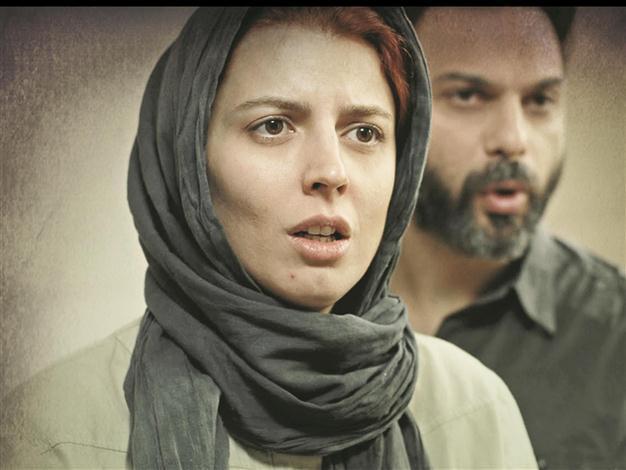Oscars bring Iran and Israel together
Emrah Güler ANKARA - Hürriyet Daily News

With a twist of fate, this year’s Oscars will bring both Iran and Israel together. Both films are among the nominees for this year’s Best Foreign Language Film
It’s not everyday you see a prestigious list of five countries that put Iran and
Israel next to one another, asking the representatives from both countries to wear their tuxes or their evening gowns and enjoy an evening of celebration, laughter and happy tears in the United States. What’s more, Turkey was so close to being on the same list.
The list has nothing to do with nuclear arms and the ever-tangled politics of the
Middle East. It’s the Oscars, and the list is the nominees for the Best Foreign Language Film. If Turkish director Nuri Bilge Ceylan’s Grand Prix winner in Cannes, “Bir Zamanlar Anadolu’da” (Once Upon A Time in Anatolia), a very likely contender until the announcement of the shortlist of nine films, was nominated for the category, it would definitely have marked a moment in history.
If Turkey had been nominated, say, instead of Canada or Poland, the irony would make many smile, with Belgium, the high and mighty center of Europe, being one of the other nominees as well. Turkey, once again, would be stuck between the two global power games, next to the Middle East and the European Union, not too keen to make Turkey one of their own.
Still, Iran and Israel, two countries not exactly fond of each other, will be competing for the Academy Award for Foreign Language Film come the award ceremony Feb. 26. In fact, Joseph Cedar, the director of “Footnote,” the nominee from Israel, said there was “something poetic” about Israel and Iran both being nominated.
Both films take a look at family relations, or rather the dark side of family relations, in the modern day of both countries. Iranian director and writer Asghar Farhadi’s “A Separation” begins with the divorce proceedings of a couple in a courthouse. As the couple tries, perhaps not very hard, to find the ideal solution for their teen daughter’s sake, the film takes a whole different turn with unexpected complications.
The film, which already won the Golden Globe for Best Foreign Language Film and garnered Farhadi another Oscar nomination for Best Original Screenplay, soon takes off into Hitchcockian territory, shedding light on women’s slow rise to power and men’s descent from it in modern-day Iran.
The Holocaust and modern-day migration
Cedar’s “Footnote” follows Eliezer and Uriel, a father and son, as well as rival professors of Talmudic studies. Both working in the same university, Eliezer has devoted himself to what is considered arcane research, while his son shines in popularity. The film won a Spirit Award, and another award at Cannes, for Best Screenplay. Cedar is no stranger to the Oscars with his “Beaufort” of 2007 another nominee in the same category. In fact, Israel has garnered three nominations in the past four years, while this is Iran’s second nomination since 1998’s “Children of Heaven.”
“In Darkness,” the nominee from Poland, is from a three-time Oscar nominee, Agnieszka Holland. The nomination is Poland’s ninth, the last one being in 2007 with “Katyn.” The film is based on the true story of Leopold Socha, a Polish petty criminal who hid Jews from the Nazis in the sewage canals of Lvov during World War II. It follows the group taking refuge into the city’s sewers, their only link to the outside world being a local sewer inspector. “In Darkness” has moved audiences across the globe, and, as Holland herself had said, the film stands against the notion that everything has been said about the Holocaust.
The Belgian filmmaking duo Dardenne brothers’ winner of Grand Jury Prize in Cannes last year, “The Kid with a Bike,” was one of the few shoo-ins for the Foreign Language nominees. Surprisingly, Belgium got in to the race with another film, “Bullhead,” the debut feature of director Michael R. Roskam.
While the film is about cattle mafia in eastern Belgium and how it impacts a young man, a very local subject, its universal take made it a favorite in various festivals throughout the year. The film recently won the Best Actor award at Palm Springs and won an audience award in the AFI Fest three months ago. This is Belgium’s sixth nomination, the last one more than a decade ago in 2000 with “Everybody’s Famous!”
The final nominee, Canada, might be the least talked about country among the nominees but has been a regular in the Oscars for years. This is Canada’s sixth nomination, one of them being last year with “Incendies,” and one win in 2003 with “The Barbarian Invasions.”
Like Denis Villeneuve, last year’s director of “Incendies,” this year’s director Philippe Falardeau is also from Quebec. His nominated film “Monsieur Lazhar” follows Bachir Lazhar, an immigrant from Algeria to Canada, waiting for his asylum application. When Bachir is hired as a substitute teacher at a French-Canadian school, he finds that he has to help deal with the tragic death of the previous teacher.
This year’s nominees once again show that local stories can be as haunting and relatable in any other part of the world if the stories are told with gusto and passion, be it about World War II Poland, cattle-rearing in Belgium, the modern-day struggles of Iranian and Israeli families or an immigrant in Canada.
Academy Awards, conflict, tension,

